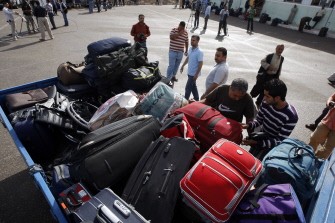RAFAH, Palestinian Territories, May 28, 2011 (AFP) - Egypt on Saturday reopened its Rafah border crossing with Gaza, allowing people to cross freely for the first time in four years, in a move hailed by Hamas but criticised by Israel.

Among the first to cross the reopened border post were two ambulances ferrying patients from the hitherto-blockaded Gaza Strip for treatment in Egypt as well as a minibus carrying a dozen visitors, an AFP correspondent reported.
The crossing is to open to people for eight hours a day from 9:00 am, apart from holidays and Fridays, giving Gazans a gateway to the world as Rafah is the only crossing which does not pass through Israel.
Under the long-awaited change, which excludes the flow of goods, people under the age of 18 or older than 40 will require only a visa to pass, but those between 18 and 40 will still need security clearance, officials said.
Commercial traffic will continue to have to pass through border points with Israel to enter the impoverished Palestinian enclave.
Egyptian Foreign Minister Nabil al-Arabi announced in April that the crossing would reopen permanently, stressing this would help ease the blockade imposed by Israel.
The border has remained largely shut since June 2006 when Israel imposed a tight blockade on Gaza after militants snatched Israeli soldier Gilad Shalit, who is still being held.
The blockade was tightened a year later when Hamas seized control of the territory, ousting forces loyal to the Western-backed Palestinian Authority.
The United Nations has called the blockade illegal and repeatedly demanded it be lifted.
The decision to permanently reopen the Rafah crossing came more than three months after former Egyptian president Hosni Mubarak resigned under pressure following 18 days of massive street protests against his rule.
It was hailed by Gaza's Islamist rulers, Hamas, and the European Union, but Israel has greeted the news with trepidation.
Hamas spokesman Fawzi Barhum said Thursday the move was "a courageous and responsible decision which falls in line with Palestinian and Egyptian public opinion."
"We hope that it is a step towards the complete lifting of the siege on Gaza," he said, a day after Egypt announced it would open the crossing on a permanent basis to ease the blockade which has been in place since 2006.
The European Union also praised the move and said it was in consultations with Egypt, the Palestinians and Israel about returning its team of advisers to monitor activity along the frontier.
But Israel expressed concern, with Home Front Defence Minister Matan Vilnai telling public radio it would create "a very problematic situation."
The move was hailed by Israeli NGO Gisha, which campaigns for freedom of movement for Palestinians.
"Gisha welcomes the announcement that Egypt will expand the ability of Gaza residents to travel abroad via Rafah crossing, which has become Gaza's gateway to the world," the group said.
The move follows an April 27 unity accord between rival Palestinian factions Hamas and the Fatah party of Palestinian leader Mahmud Abbas that was signed in the Egyptian capital.
"This new Cairo spring is bearing fruit such as the Rafah opening and efforts to end the blockade," said Nabil Shaath, a senior Fatah official on a visit to the Gaza Strip.
Figures provided by the NGO show that over the past year, an average of 19,000 people a month have used the crossing -- just 47 percent of the number who used it in the first half of 2006.
























